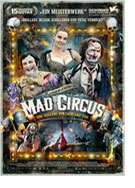

Opening 8 Dec 2011
Directed by:
Álex de la Iglesia
Writing credits:
Álex de la Iglesia
Principal actors:
Carlos Areces, Antonio de la Torre, Carolina Bang, Manuel Tallafé, Alejandro Tejerías
The circus of our childhood was always fun and exciting, full of happy memories, but circus films often show a behind-the-scenes bitterness and strife. For example, there is unhappiness, failure and crime in The Circus by Charlie Chaplin from 1928, or The Greatest Show on Earth by Cecil B. DeMille from 1952. Mad Circus (English title: The Last Circus) is no exception. The film opens in 1937 in the midst of Spain’s civil war where the militia recruits the clowns straight out of the big top’s center ring. These clowns go to war armed with machetes and are still in their clown suits. The father of Javier, the Dumb Clown, suffers this fate, causing Javier (Carlos Areces) to suffer a deprived childhood, burdened with a promise to his father to take revenge. Fast forward to 1973 when sad Javier applies to become a circus clown, and naturally, due to his long face and sad eyes, must become a Sad Clown. The Happy Clown Sergio (Antonio de la Torre) is a sadistic husband to Natalia (Carolina Bang) who wins admirers with her expertise on the trapeze. One admirer is Javier, who falls in love and provokes Sergio in an attempt to save Natalie from his jealous violence.
The film, written and directed by Alex de la Iglesia, lives from its amazing scenes and props and ends with a struggle on a high monument, reminiscent of Hitchcock’s North by Northwest, or King Kong and Fay Wray. The costumes and make-up add to the atmosphere. There is a thin line between a clown and a murderer, and the action is breathlessly violent, in spite of clownery under the circus tent; the music supports the action wonderfully – none of this plunk-plink music so often interchangeable in films. Luckily, there is some comic relief as a flying circus performer attempts to complete a stunt on his motorcycle. He is often unsuccessful, but always cheerful. You could say this is about a three-sided love affair, but there is much more: history and humanity embedded in hopelessness, fate, and weakness.
This film showed in the Toronto film festival and won best director and screenplay in the 2010 Venice film festival. (Quentin Tarantino was the president of the jury and we know what Tarantino likes.) The press notes claim that the mean (happy) clown represents the dictator Franco, the sad clown is the resistance to this government, and the beautiful Natalia stands for the masochism of Spain, which cannot recover from its history. That’s all good and well, but anyone can enjoy the film on its own merits without any knowledge of Spanish history and possible symbolism. (Becky Tan)